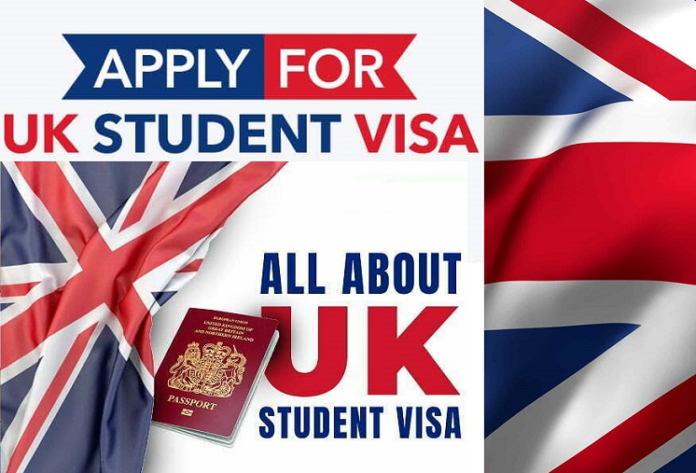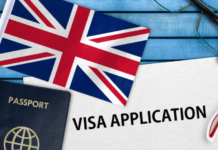So, you’ve dreamt of studying in the UK, the land of Big Ben, historic castles, and cutting-edge universities. But before you pack your bags and hop on a plane, there’s the crucial hurdle of securing the UK International Students Visa in 2024.
This guide will equip you with all the knowledge you need to navigate the UK International Students visa application process smoothly.
Key Changes for 2024 Applicants: Adapting to New Rules
The UK implemented some significant changes to its student visa program in 2024. One of the most notable is the restriction on bringing dependents. Previously, students on certain visas could bring their spouse and children. Now, the only exception applies to those pursuing postgraduate research programs (PhDs or research-based higher degrees). This can significantly impact your decision-making process, so be sure to factor it in.
Another update concerns scholarships and sponsorships. Previously, government-sponsored students could bring dependents regardless of course length. Now, the term “scholarship or sponsorship” has replaced “award,” ensuring consistency across the application process.
Types of UK Student Visas: Finding Your Perfect Fit
We skimmed the surface of UK student visa types. Now, let’s delve deeper to ensure you choose the perfect fit for your academic aspirations:
-
Short-Term Study Visa (Less Than 6 Months):
Perfect for:
- English Language Courses: This visa caters to those seeking intensive English language programs to improve their fluency. The maximum duration is 11 months.
- Short-Term Academic Programs: It also applies to shorter academic programs like summer courses, workshops, or specialized training lasting less than six months.
Things to Remember:
- You cannot work while on this visa.
- You cannot switch to another visa type within the UK.
-
Student Visa (Full-Time Degree Programs Exceeding 6 Months):
This is the most sought-after visa for international students pursuing a full-time degree in the UK. It encompasses:
- Undergraduate Degrees: This includes Bachelor’s degrees across various disciplines offered by universities and colleges.
- Postgraduate Degrees: If you’re aiming for a Master’s degree, Ph.D., or another postgraduate qualification, this visa is your key.
- Pre-sessional Courses: This visa caters to students taking preparatory courses before starting their main degree program.
Benefits of the Student Visa:
- Part-time Work Allowance: You can work part-time for up to 20 hours per week during term time and full-time during vacations. This allows you to gain valuable experience and contribute to your living expenses.
- Dependents (Limited Cases): As of 2024, only students enrolled in postgraduate research programs (PhDs or research-based higher degrees) can bring their dependents (spouse and children).
Choosing the Right Visa: A Crucial Decision
Picking the correct visa hinges on your program’s duration and type. Here’s a quick guide:
- For courses under 6 months, including English language programs (up to 11 months): Apply for the Short-Term Study Visa.
- For any full-time degree program exceeding 6 months (undergraduate, postgraduate, or pre-sessional courses): Opt for the Student Visa.
If your program involves research and exceeds six months, explore the possibility of postgraduate research programs to see if you qualify to bring dependents under the Student Visa.
By understanding the nuances of each visa category, you can make an informed decision and embark on your academic journey in the UK with confidence.
Eligibility Requirements for the UK International Students Visa 2024
Securing the UK International Students Visa hinges on meeting specific eligibility criteria. Let’s dissect these requirements in detail to ensure your application shines:
-
Offer Letter from a Licensed Sponsor:
- University Acceptance is Key: Obtaining an unconditional offer of admission from a reputable university or college with a sponsor license is paramount. This signifies the institution accepts you for your chosen program.
- Sponsor License Verification: Double-check if your chosen institution holds a current sponsor license from the UK Visas and Immigration (UKVI). You can verify this on the UKVI website.
-
Financial Muscle: Demonstrating Sufficient Funds
- Maintenance Requirements: You’ll need to prove you have enough funds to cover your tuition fees and living expenses for the entire duration of your studies.
- Living Cost Variations: The required amount varies depending on your location (London is typically more expensive). The UKVI website provides location-specific cost estimates.
- Proof of Funds: Present bank statements, scholarship letters, or sponsorships demonstrating your access to the required funds.
-
English Language Proficiency: Meeting the Benchmark
- Demonstrating Fluency: You must showcase your English language proficiency by taking a Secure English Language Test (SELT) like IELTS or PTE.
- Minimum Score Requirements: The minimum required score varies depending on the program level and the university’s specific requirements. Check the university website for details.
-
Tuberculosis Test (if applicable):
- Nationality Check: Depending on your home country, you might need a valid Tuberculosis (TB) test certificate as part of your application.
Other Additional Considerations:
- Age Restrictions: Generally, there’s no minimum age limit to apply for a student visa. However, some universities might have age restrictions for specific programs.
- Criminal Record Checks: In certain cases, you may need to provide a police clearance certificate from your home country.
Meeting the minimum requirements is just the first step. A strong application showcases that you’re a genuine student with a clear academic purpose and the financial means to support your studies in the UK. Compile all the necessary documents meticulously to bolster your application’s credibility.
By thoroughly understanding and fulfilling the eligibility criteria, you’ll be well on your way to obtaining the UK International Students Visa in 2024. Now, let’s explore some additional steps you can take to strengthen your application even further.
The Application Procedure for UK International Students Visa 2024
Conquering the UK International Students visa application process requires meticulous planning and a clear understanding of the steps involved. Here’s a breakdown to guide you through the maze:
Step 1: Gather Your Essential Documents
Before you embark on the online application journey, ensure you have all the necessary documents assembled. Refer back to the eligibility requirements section (previous discussion) to create a comprehensive checklist. Here are some key documents to keep handy:
- Valid Passport: Your passport must be valid for at least six months beyond your intended stay in the UK.
- Offer Letter: The official acceptance letter from your sponsor-licensed university for your chosen program.
- Financial Proof: Bank statements, scholarship letters, or sponsorship documents demonstrating sufficient funds.
- English Language Test Results: Original copies of your SELT results (IELTS or PTE) meeting the required score.
- Tuberculosis Test Certificate (if applicable): A valid TB test certificate if required based on your nationality.
- Academic Transcripts: Certified copies of your academic transcripts from previous institutions.
- Personal Statement: A compelling essay outlining your academic goals and motivations for studying in the UK.
Step 2: The Online Application Platform
- UK Visas and Immigration (UKVI): Head over to the UKVI website, the official portal for visa applications: https://www.gov.uk/browse/visas-immigration.
- Create an Account: Register for an online account on the UKVI website. This allows you to access the application form and track your application status.
- Complete the Online Form: Carefully fill out the online student visa application form. Ensure all information is accurate and up-to-date.
Step 3: Visa Application Fee
- Payment Portal: You’ll need to pay the visa application fee online using the UKVI website’s secure payment portal. The current fee for a student visa is £490 (subject to change).
Step 4: Biometric Enrollment – Capturing Your Identity
- Appointment Booking: Following your online application, schedule a biometric enrollment appointment at a designated visa application center.
- Appointment Day: During your appointment, provide fingerprints and a digital photograph for biometric verification.
Step 5: Application Processing Time
- Processing Timeline: The processing time for student visas can vary depending on your nationality and workload at UKVI. Generally, it can take anywhere between a few weeks to several months.
- Track Your Application: Use your online UKVI account to track the progress of your application.
Step 6: Decision Time – Communication from UKVI
- Email Notification: UKVI will notify you via email of their decision on your visa application. The email will instruct you on how to collect your passport if your visa is granted.
Some Additional Tips for a Smooth Application Process:
- Start Early: Begin the application process well in advance of your intended study start date to account for processing times.
- Double-Check Everything: Proofread your application form thoroughly before submission to ensure accuracy.
- Maintain Clear Communication: Keep your contact information updated in your UKVI account and respond promptly to any requests for additional information.
By following these steps and remaining organized throughout the process, you’ll significantly increase your chances of a successful UK International Students visa application in 2024. Remember, a well-prepared and well-presented application demonstrates your seriousness and commitment to studying in the UK.
Frequently Asked Questions about the UK International Students Visa 2024
Congratulations on taking the exciting step towards studying in the UK! To ensure a smooth journey, here are some frequently asked questions regarding the UK International Students Visa in 2024:
Q: I’m still unsure about the English language proficiency requirements. What scores do I need?
A: The minimum English language score required depends on the specific program and university. It’s best to check the university website for their exact requirements. However, generally, most undergraduate programs require a minimum score of 6.0 on the IELTS test, with some demanding higher scores for specific subjects.
Q: What documents do I need for proof of funds?
A: For proof of funds, you can provide:
- Recent bank statements for the past 28-30 days showcasing sufficient funds to cover your tuition fees and living expenses for the entire study duration.
- A scholarship letter if you’re receiving financial aid.
- A sponsorship letter if someone is financially supporting your studies.
Q: Can I work while studying in the UK on a Student Visa?
A: Yes, the Student Visa allows you to work part-time for up to 20 hours per week during term time and full-time during vacations. This is a fantastic way to gain valuable work experience and contribute to your living expenses.
Q: How much does a UK Student Visa cost?
A: The current visa application fee is £490 (subject to change).
Q: How long does it take to process a Student Visa application?
A: Processing times can vary, typically ranging from a few weeks to several months.
Q: What if my application for a Student Visa gets rejected?
A: If your visa application gets rejected, you’ll receive a rejection letter outlining the reasons. You can choose to reapply, addressing the issues raised in the rejection. It’s crucial to carefully review the reasons and ensure you meet all the requirements before resubmitting your application.
Q: What happens after I get my Student Visa?
A: Once your visa is granted, you’ll receive a Biometric Residence Permit (BRP) upon arrival in the UK. This acts as your official immigration permission to stay and study in the UK. Remember to check the validity period on your BRP and ensure you renew it if you plan to extend your studies.
Q: Can I bring my dependents with me on a Student Visa?
A: As of 2024, only students enrolled in postgraduate research programs (PhDs or research-based higher degrees) can bring their dependents (spouse and children).
Q: Where can I find more information about the UK student visa process?
A: Here are some helpful resources:
- UK Visas and Immigration (UKVI): https://www.gov.uk/browse/visas-immigration
- UKCISA (UK Council for International Student Affairs): https://www.ukcisa.org.uk/
Remember: Thorough research, meticulous preparation, and a proactive approach will equip you to navigate the UK student visa application process successfully.
Conclusion
By understanding the latest regulations, assembling a robust application, and utilizing the resources available, you’ll be well on your way to obtaining the UK International Students Visa in 2024. Remember, thorough research, meticulous preparation, and a dash of determination are the keys to unlocking your academic adventure in the UK. Best of luck!












